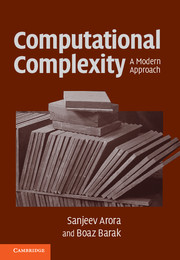Book contents
- Frontmatter
- Contents
- About this book
- Acknowledgments
- Introduction
- 0 Notational conventions
- PART ONE BASIC COMPLEXITY CLASSES
- 1 The computational model – and why it doesn't matter
- 2 NP and NP completeness
- 3 Diagonalization
- 4 Space complexity
- 5 The polynomial hierarchy and alternations
- 6 Boolean circuits
- 7 Randomized computation
- 8 Interactive proofs
- 9 Cryptography
- 10 Quantum computation
- 11 PCP theorem and hardness of approximation: An introduction
- PART TWO LOWER BOUNDS FOR CONCRETE COMPUTATIONAL MODELS
- PART THREE ADVANCED TOPICS
- Appendix: Mathematical background
- Hints and selected exercises
- Main theorems and definitions
- Bibliography
- Index
- Complexity class index
10 - Quantum computation
from PART ONE - BASIC COMPLEXITY CLASSES
Published online by Cambridge University Press: 05 June 2012
- Frontmatter
- Contents
- About this book
- Acknowledgments
- Introduction
- 0 Notational conventions
- PART ONE BASIC COMPLEXITY CLASSES
- 1 The computational model – and why it doesn't matter
- 2 NP and NP completeness
- 3 Diagonalization
- 4 Space complexity
- 5 The polynomial hierarchy and alternations
- 6 Boolean circuits
- 7 Randomized computation
- 8 Interactive proofs
- 9 Cryptography
- 10 Quantum computation
- 11 PCP theorem and hardness of approximation: An introduction
- PART TWO LOWER BOUNDS FOR CONCRETE COMPUTATIONAL MODELS
- PART THREE ADVANCED TOPICS
- Appendix: Mathematical background
- Hints and selected exercises
- Main theorems and definitions
- Bibliography
- Index
- Complexity class index
Summary
Turning to quantum mechanics … secret, secret, close the doors! we always have had a great deal of difficulty in understanding the world view that quantum mechanics represents. … It has not yet become obvious to me that there's no real problem. I cannot define the real problem, therefore I suspect there's no real problem, but I'm not sure there's no real problem. So that's why I like to investigate things.
– Richard Feynman, 1964The only difference between a probabilistic classical world and the equations of the quantum world is that somehow or other it appears as if the probabilities would have to go negative.
– Richard Feynman, in “Simulating Physics with Computers,” 1982Our first result is the existence of an efficient universal quantum Turning machine in Deutsch's model. … We give the first formal evidence that quantum Turning machines violate the modern complexity theoretic formulation of the Church Turning thesis. We show the existence of a problem relative to an oracle that can be solved in polynomial time on a quantum Turning machine but require super polynomial time on a bounded error probabilistic Turning machine.
– E. Bernstein and U. Vazirani, “Quantum Complexity Theory,” 1997Quantum computing is a new computational model that may be physically realizable and may provide an exponential advantage over “classical” computational models such as probabilistic and deterministic Turing machines.
- Type
- Chapter
- Information
- Computational ComplexityA Modern Approach, pp. 201 - 236Publisher: Cambridge University PressPrint publication year: 2009



